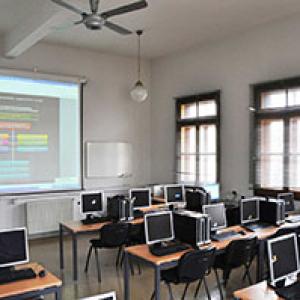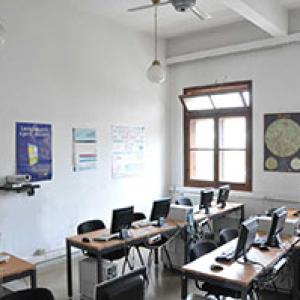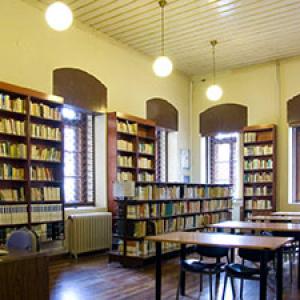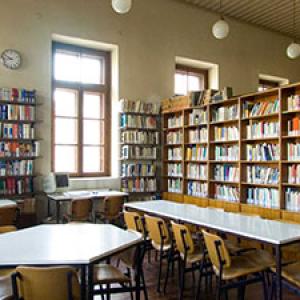Καλώς ήρθατε
Welcome to the Laboratory of Digital Technologies in the Teaching of Foreign Language and Communication.
The main objectives of the Lab are:
- to train undergraduate and postgraduate students throughout the Department in the use of New Digital Technologies and language applications,
- to support the research of the Linguistics/Didactics Department in the field of digital multimedia language applications,
- to support the research of members of the Department in the field of technological, multilingual and pedagogical applications,
- to provide specialised services and training programmes in the areas of teaching and technological language applications.
The Lab has also supported and actively supports the teaching and research of the Postgraduate Study Programmes and, to the extent possible, in the development of research projects.
The modern equipment and the specialised scientific staff of the Lab allow the development of collaborations with other research centres and universities in Europe and the provision of specialised services and training programmes in the areas of digital language applications. Its resources have so far come from public and private sector bodies, as well as from European Union actions (LINGUA, MED-CAMPUS, LEONARDO, EKT, EPEAEK, etc.).
The Lab also provides important social work through specific actions, such as support to the certification programmes of the Hellenic Ministry of Education, the organisation of seminars for the training of foreign language teachers and other individual activities of its members.
Workshop premises: Room: 307, 308A, 308B, 308C, 308D, Old building of the Faculty of Philosophy of the Aristotle University of Thessaloniki, Tel.: 2310-998852.




Language Didactics & Communication
Digital Technologies & Language Didactics
Multilingual & Intercultural Communication
Interdisciplinarity & Cooperation
Our goals
The primary mission of the Laboratory of Digital Technologies in the Teaching of Foreign Languages and Communication - includes:
Fulfilling teaching and research demands at both undergraduate and postgraduate levels within the Laboratory's scope.
Developing skilled scientists equipped with theoretical and practical expertise in areas mandated by law and relevant to the Laboratory’s focus.
Collaborating extensively with Research Centres, Academic Institutions, and Institutes both in Greece and internationally that share similar or related goals, particularly those offering services in language education and cultural studies.
Organizing and hosting a comprehensive array of scientific events, including lectures, workshops, seminars, symposia, and conferences, and publishing scholarly articles. Additionally, facilitating the participation of distinguished scientists from around the globe.
Providing specialized services to individuals in compliance with the provisions of act 159/1984 (Vol. A, No. 53).
Compiling, analyzing, safeguarding, and disseminating diverse linguistic data to further research and application in the field of digital technologies in language education.
MAIN ACTIVITIES
ΔΙΔΑΚΤΙΚΗ ΤΗΣ ΞΕΝΗΣ ΓΛΩΣΣΑΣ & ΣΥΛΛΟΓΗ ΓΛΩΣΣΙΚΩΝ ΔΕΔΟΜΕΝΩΝ
ΕΠΙΚΟΙΝΩΝΙΑ, ΔΙΑΠΟΛΙΤΙΣΜΙΚΗ ΕΠΙΚΟΙΝΩΝΙΑ
ΨΗΦΙΑΚΕΣ ΤΕΧΝΟΛΟΓΙΕΣ ΚΑΙ ΟΠΤΙΚΟΑΚΟΥΣΤΙΚΗ ΕΠΙΚΟΙΝΩΝΙΑ
ΓΛΩΣΣΕΣ & ΕΚΠΑΙΔΕΥΣΗ
COLLABORATION WITH
Laboratory of Digital Humanities
Laboratory of Digital Humanities
Faculty of Philosophy, Aristotle University of Thessaloniki
Laboratory website: http://digitalhumanitieslab.eu/en/
Laboratory of Semiotics
Semiotic Lab-SemioLab, Aristotle University of Thessaloniki, Faculty of Philosophy
Laboratory website: http://semiolab.eu/
FORELL Lab
Web page: http://forell.labo.univ-poitiers.fr/









